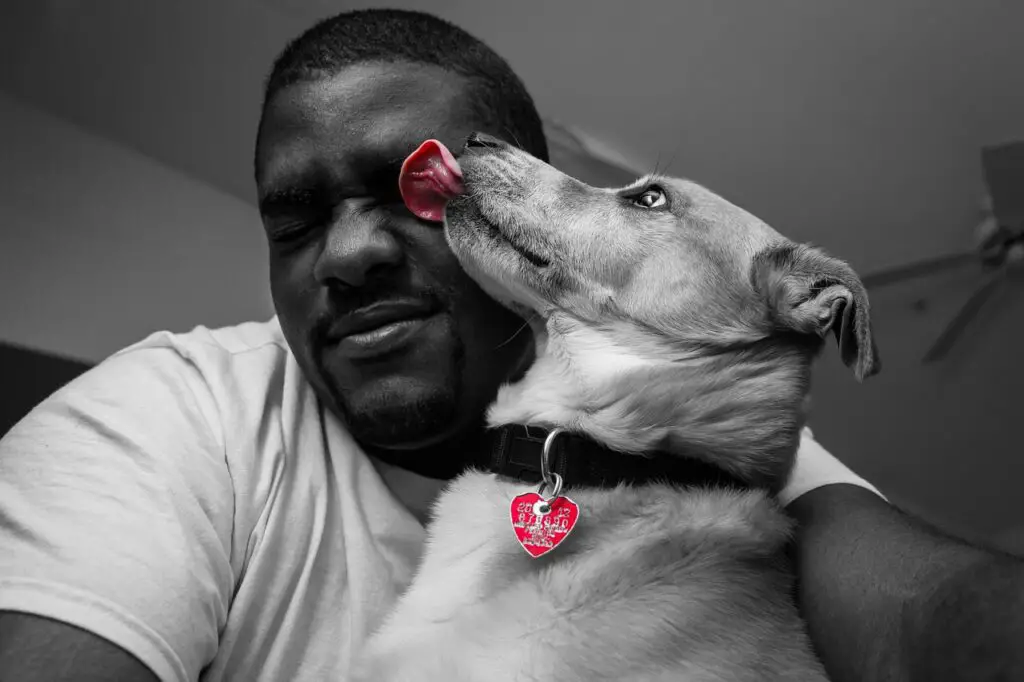Rabies is a viral disease that affects the nervous system of mammals, including dogs and humans.
It’s most commonly spread through the bite of an infected animal, but can also be transmitted through scratches or exposure to infected saliva.
One question that often arises around rabies is whether dog licking can cause the disease.
Let’s find out.
- What Is Rabies?
- Can Dog Licking Cause Rabies?
- Can Rabies Transmit Through Licking?
- Can You Get Rabies From Vaccinated Dog Lick?
- Can You Get Rabies From Food a Dog Licked
- Can You Get Rabies From a Dog Licking Your Hand
- What Viruses Can Be Found In a Dog’s Mouth?
- Can Dogs Carry Rabies Without Symptoms?
- In Conclusion
What Is Rabies?

Rabies is a preventable viral disease that affects the central nervous system of mammals, including dogs and humans.
It’s transmitted through the saliva of an infected animal, most often through a bite or scratch. Once symptoms appear, rabies is almost always fatal.
The early symptoms of rabies can be non-specific and flu-like in nature, including fever, headache, and general weakness or discomfort.
As the disease progresses, more severe symptoms may emerge, such as anxiety, confusion, agitation, hallucinations, hydrophobia (fear of water), and paralysis.
The acute period of the disease typically lasts from 2 to 10 days, after which the infected individual will either fall into a coma and die or begin to recover.
Can Dog Licking Cause Rabies?

Yes, the saliva of an infected animal can transmit the disease if it comes into contact with an open wound or mucus membranes such as those found in your mouth, nose, and eyes.
However, there has never been a documented case of human-to-human transmission of rabies caused by contact with an infected animal’s saliva.
Rabies is spread primarily through biting and can only be transmitted to humans if an animal carrying the virus bites them.
Additionally, saliva contamination from a rabid animal’s bite could also cause an infection if it makes contact with open wounds or enters the body via mucous membranes like eyes or nose.
Can Rabies Transmit Through Licking?
Yes. It is possible for a dog with rabies to transmit the virus through licking, but the risk of transmission in this way is considered low.
The rabies virus is usually spread through the saliva of infected domestic and wild animals when they bite or scratch or if they lick an open wound, broken skin, and eyes, mouth, or nose.
According to the Centers for Disease Control and Prevention (CDC), transmission of the virus generally requires direct contact between infected saliva and the bloodstream or nervous system.
Can You Get Rabies From Vaccinated Dog Lick?
While it is highly unlikely for a vaccinated dog to transmit rabies through licking, there is still a slight risk.
Vaccination greatly reduces the chance of a dog contracting and transmitting the virus, but no vaccine is 100% effective.
According to the World Health Organization (WHO), the presence of neutralizing antibodies in a dog’s blood is a good indicator of immunity to rabies.
However, it’s important to note that the antibody response can vary depending on the individual dog and the vaccine used.
If you have been licked by a vaccinated dog and are concerned about the potential for rabies transmission, it’s important to monitor the area for any signs of infection or unusual symptoms.
It’s also a good idea to consult with a healthcare professional or veterinarian, especially if the dog’s vaccination status is unknown or if you are experiencing any concerning symptoms.
Can You Get Rabies From Food a Dog Licked
No. According to the Centers for Disease Control and Prevention (CDC), transmission of the rabies virus generally requires direct contact between infected saliva and the bloodstream or nervous system.
The virus is usually spread through the saliva of infected domestic and wild animals when they bite or scratch or if they lick an open wound, broken skin, and eyes, mouth, or nose.
While it is theoretically possible for rabies to be transmitted through licking contaminated food, the risk of transmission in this way is considered extremely low.
The virus is unlikely to be present in sufficient quantities in saliva alone to cause infection.
Can You Get Rabies From a Dog Licking Your Hand
Yes. It is possible for rabies to be transmitted if a dog with rabies licks an open wound on your hand.
The rabies virus is usually spread through the saliva of infected domestic and wild animals when they bite or scratch or if they lick an open wound, broken skin, and eyes, mouth, or nose.
While the risk of transmission in this way is considered low, it’s still important to exercise caution around dogs with unknown vaccination status or those that may have been exposed to the virus.
What Viruses Can Be Found In a Dog’s Mouth?
- Canine Oral Papilloma Virus: This virus causes the formation of warts or papillomas in and around a dog’s mouth. Oral papillomas are usually harmless and will eventually disappear on their own, but they can be contagious and cause discomfort for the affected dog.
- Canine Distemper Virus: This virus is highly contagious and can cause respiratory, gastrointestinal, and neurological symptoms in dogs. The virus is spread through contact with infected animals or contaminated surfaces, and it can be fatal if left untreated.
- Herpes Virus: This virus can cause respiratory and ocular symptoms in dogs, as well as reproductive problems in pregnant females. While the virus is usually not life-threatening, it can have serious health consequences for puppies and senior dogs.
- Parvovirus: This virus is highly contagious and can cause vomiting, diarrhea, and dehydration in dogs. Puppies are particularly susceptible to parvovirus, and the infection can be fatal if not treated promptly.
- Rabies Virus: While not typically found in a dog’s mouth, the rabies virus can be transmitted through the saliva of infected animals. Rabies is a serious and often fatal disease that affects the nervous system, and it can be transmitted to humans through bites or scratches from infected animals.
Can Dogs Carry Rabies Without Symptoms?
Yes, dogs can carry rabies without showing any symptoms.
The virus can take anywhere from 3 to 12 weeks to reach the brain, and during this time, the infected dog may appear completely healthy.
According to the World Health Organization (WHO), dogs are the primary host of rabies in many parts of the world, and it’s estimated that millions of dogs are infected with the virus each year.
In Conclusion
In conclusion, although it is possible for a dog with rabies to transmit the virus through licking, the risk of transmission in this way is considered low.
While it’s important to take precautions when interacting with animals, especially those that are unknown or potentially infected with the virus, people should not panic about contracting rabies from a dog licking them.
However, if you suspect that an animal may be infected with rabies or have been exposed to the virus, it’s important to seek medical attention right away.





Leave a Reply